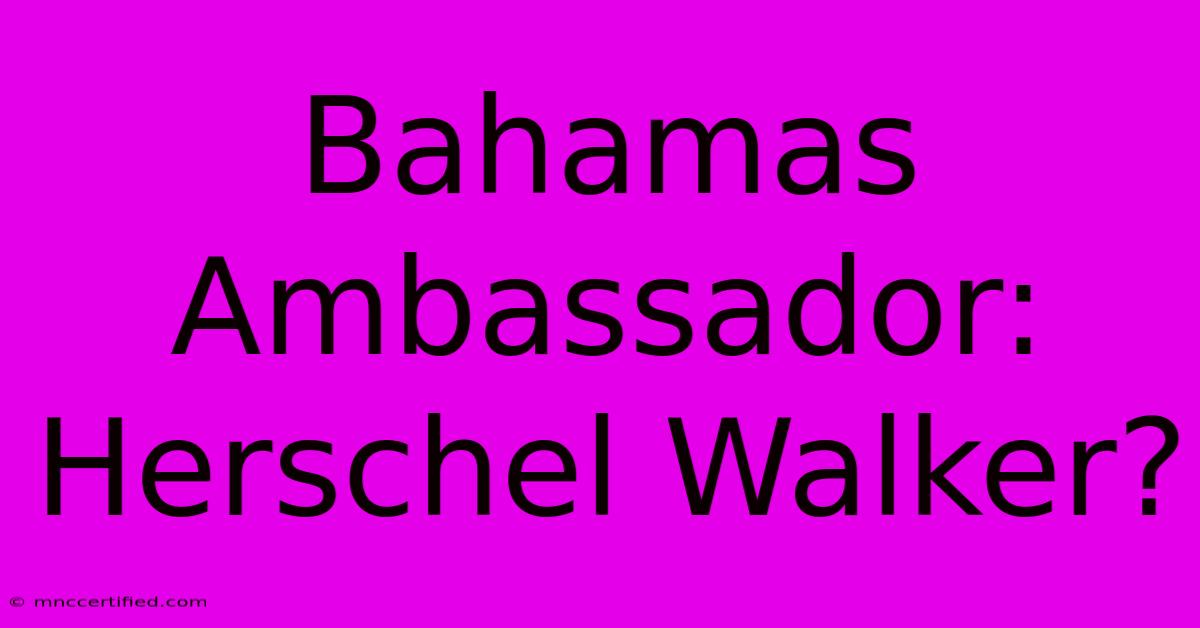Bahamas Ambassador: Herschel Walker?

Table of Contents
Bahamas Ambassador: Herschel Walker? Debunking the Viral Misinformation
The internet is a whirlwind of information, and unfortunately, a significant portion of that information is inaccurate or entirely fabricated. Recently, a false claim has been circulating online suggesting that Herschel Walker, the former American football star and politician, is the new Bahamian Ambassador. This article aims to debunk this misinformation and explore the importance of verifying online information before sharing it.
The Truth: No Evidence Supports Walker's Appointment
There is no credible evidence to support the claim that Herschel Walker is the Bahamian Ambassador. No official announcements have been made by the Bahamian government, neither through press releases, official websites, nor reputable news sources. The spread of this false information highlights the dangers of relying solely on unverified social media posts and online forums.
Understanding the Spread of Misinformation
The rapid dissemination of false information, often through social media platforms, is a growing concern. Several factors contribute to this phenomenon:
- Lack of Fact-Checking: Many users share information without verifying its authenticity. This can unintentionally lead to the amplification of false narratives.
- Confirmation Bias: People tend to believe information that aligns with their pre-existing beliefs, regardless of its veracity.
- Algorithmic Amplification: Social media algorithms often prioritize engagement, inadvertently boosting the visibility of sensational, albeit false, content.
How to Spot and Avoid Misinformation
Developing critical thinking skills is crucial in navigating the digital landscape. Here are some tips to help you identify and avoid misinformation:
- Check Multiple Reputable Sources: Before believing any piece of information, consult several trustworthy news outlets and official websites.
- Consider the Source: Evaluate the credibility of the source sharing the information. Is it a known reputable organization or a less reliable account?
- Look for Evidence: Does the claim provide concrete evidence or rely on hearsay and speculation?
- Beware of Sensational Headlines: Clickbait headlines often signal questionable content.
- Cross-Reference Information: Compare the information with reports from multiple sources to identify inconsistencies.
The Importance of Media Literacy
In today's digital age, media literacy is paramount. It's not enough to simply consume information; we must actively engage in critical evaluation and verification. This includes understanding the sources of information, recognizing biases, and developing the ability to distinguish between fact and fiction.
Protecting Yourself and Others from False Information
Sharing false information, even unintentionally, can have serious consequences. It can mislead individuals, damage reputations, and even incite unrest. Always take the time to verify information before sharing it online.
Conclusion: The Need for Verification
The false claim about Herschel Walker being the Bahamian Ambassador serves as a potent reminder of the importance of verifying information before sharing it. By developing strong media literacy skills and practicing critical thinking, we can all contribute to a more informed and responsible online environment. Let's prioritize truth and accuracy in our digital interactions. Remember, always double-check your sources!

Thank you for visiting our website wich cover about Bahamas Ambassador: Herschel Walker?. We hope the information provided has been useful to you. Feel free to contact us if you have any questions or need further assistance. See you next time and dont miss to bookmark.
Featured Posts
-
Bridgewater As Emergency Nfl Quarterback
Dec 19, 2024
-
Arsenal Edges Palace 3 2 Full Report
Dec 19, 2024
-
77 Year Old Arnold New Look Surprises Fans
Dec 19, 2024
-
2024 Efl Arsenal Vs Crystal Palace Viewing Guide
Dec 19, 2024
-
Vick Accepts Norfolk State Role
Dec 19, 2024